Mental Illness, Recovery, and Biomedical Model Analysis
VerifiedAdded on 2022/11/09
|11
|3529
|357
Essay
AI Summary
This essay delves into the biomedical model of mental health, highlighting its focus on biological factors and pharmacological treatments for mental disorders. It contrasts this model with the mental health recovery paradigm, which emphasizes individual strengths and support systems. The essay explores how the biomedical model influences psychological diagnosis and worker competencies, including skills acquisition, training, and flexibility. It compares and contrasts the biomedical and recovery models, discussing their differing approaches to treatment and patient involvement. Furthermore, the essay examines the compatibility of the biomedical model with the recovery model, emphasizing the importance of worker competencies in supporting mental health recovery and promoting positive patient outcomes, referencing relevant research and studies to support its arguments and analysis.
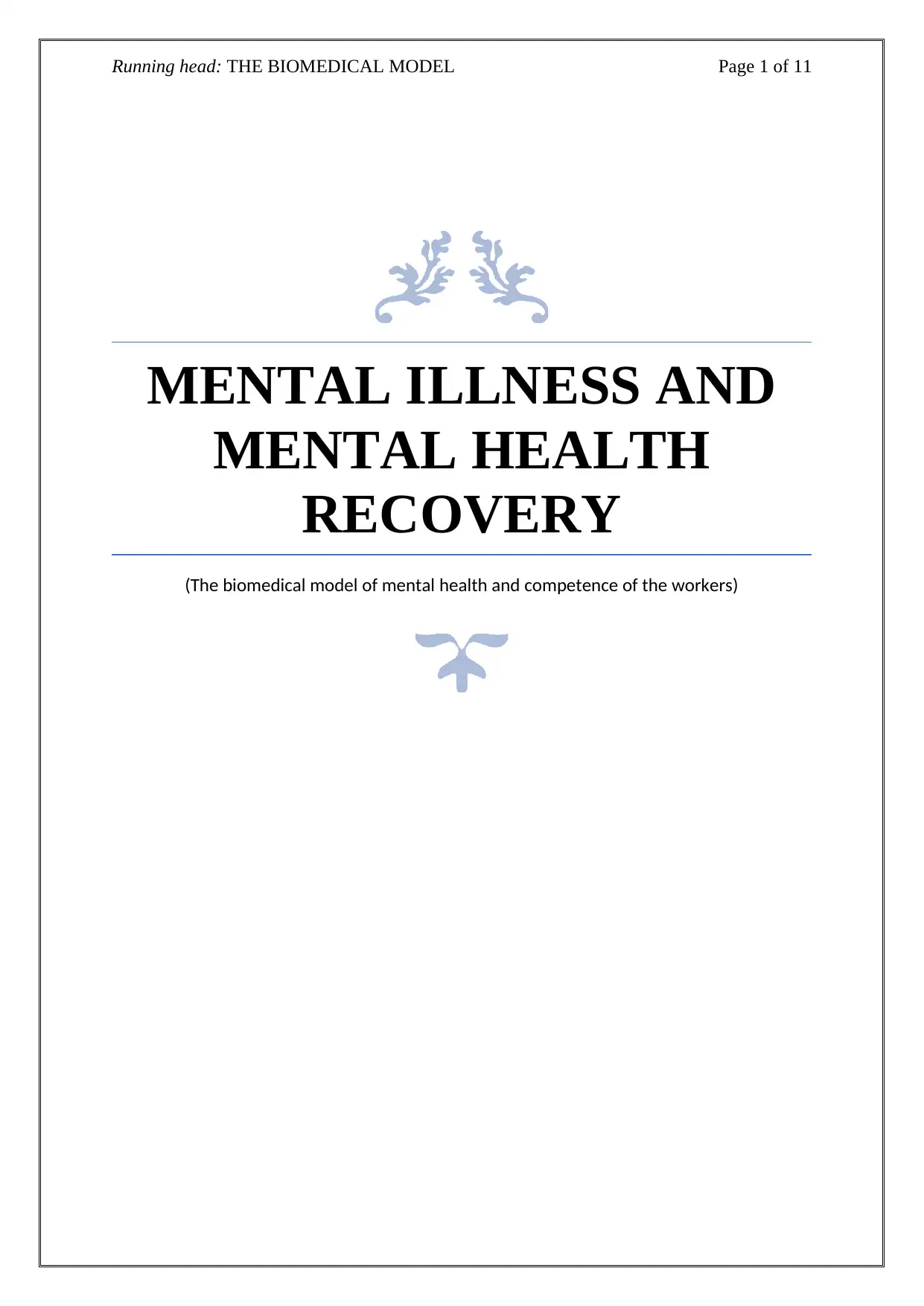
Running head: THE BIOMEDICAL MODEL Page 1 of 11
MENTAL ILLNESS AND
MENTAL HEALTH
RECOVERY
(The biomedical model of mental health and competence of the workers)
MENTAL ILLNESS AND
MENTAL HEALTH
RECOVERY
(The biomedical model of mental health and competence of the workers)
Paraphrase This Document
Need a fresh take? Get an instant paraphrase of this document with our AI Paraphraser
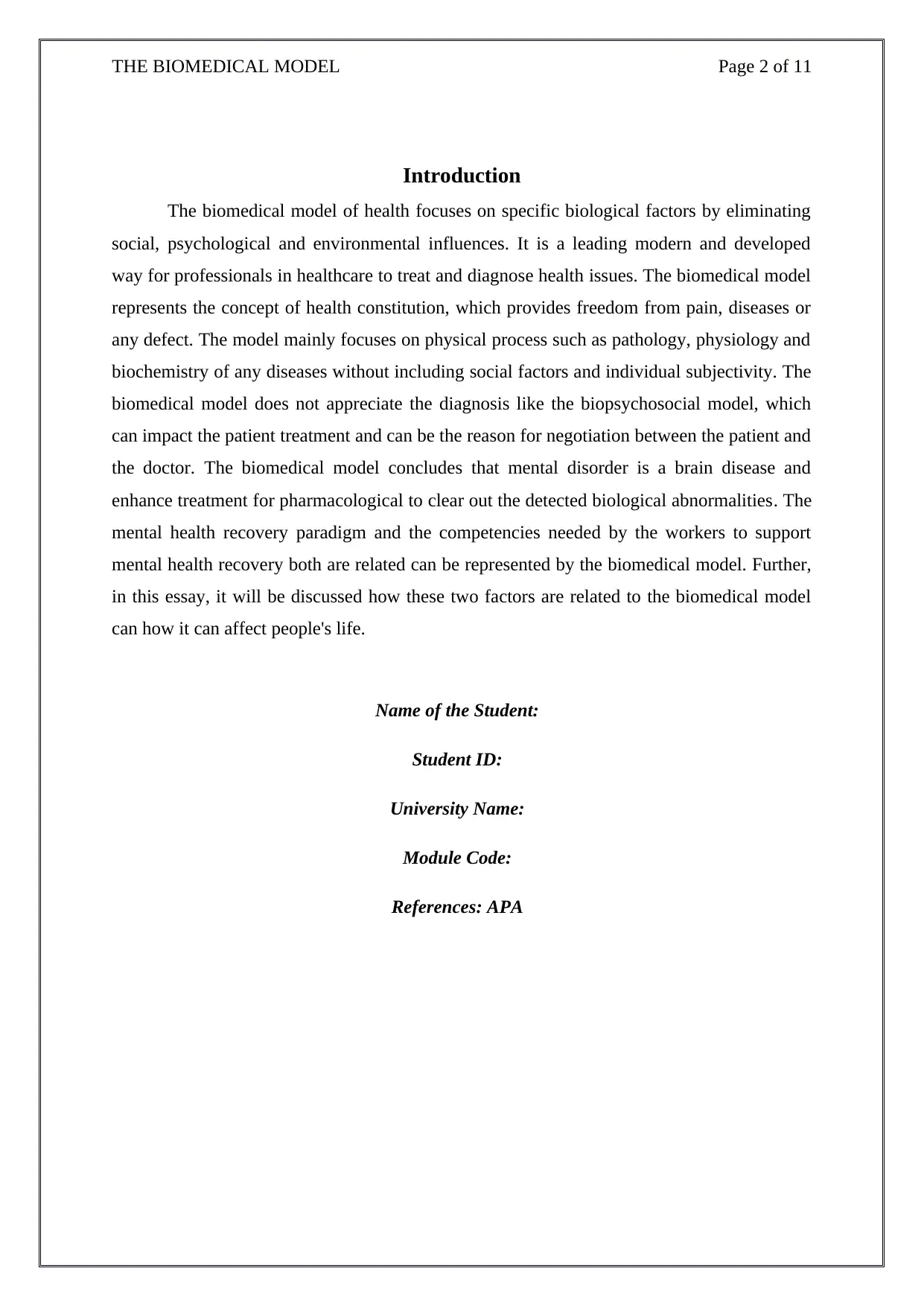
THE BIOMEDICAL MODEL Page 2 of 11
Introduction
The biomedical model of health focuses on specific biological factors by eliminating
social, psychological and environmental influences. It is a leading modern and developed
way for professionals in healthcare to treat and diagnose health issues. The biomedical model
represents the concept of health constitution, which provides freedom from pain, diseases or
any defect. The model mainly focuses on physical process such as pathology, physiology and
biochemistry of any diseases without including social factors and individual subjectivity. The
biomedical model does not appreciate the diagnosis like the biopsychosocial model, which
can impact the patient treatment and can be the reason for negotiation between the patient and
the doctor. The biomedical model concludes that mental disorder is a brain disease and
enhance treatment for pharmacological to clear out the detected biological abnormalities. The
mental health recovery paradigm and the competencies needed by the workers to support
mental health recovery both are related can be represented by the biomedical model. Further,
in this essay, it will be discussed how these two factors are related to the biomedical model
can how it can affect people's life.
Name of the Student:
Student ID:
University Name:
Module Code:
References: APA
Introduction
The biomedical model of health focuses on specific biological factors by eliminating
social, psychological and environmental influences. It is a leading modern and developed
way for professionals in healthcare to treat and diagnose health issues. The biomedical model
represents the concept of health constitution, which provides freedom from pain, diseases or
any defect. The model mainly focuses on physical process such as pathology, physiology and
biochemistry of any diseases without including social factors and individual subjectivity. The
biomedical model does not appreciate the diagnosis like the biopsychosocial model, which
can impact the patient treatment and can be the reason for negotiation between the patient and
the doctor. The biomedical model concludes that mental disorder is a brain disease and
enhance treatment for pharmacological to clear out the detected biological abnormalities. The
mental health recovery paradigm and the competencies needed by the workers to support
mental health recovery both are related can be represented by the biomedical model. Further,
in this essay, it will be discussed how these two factors are related to the biomedical model
can how it can affect people's life.
Name of the Student:
Student ID:
University Name:
Module Code:
References: APA
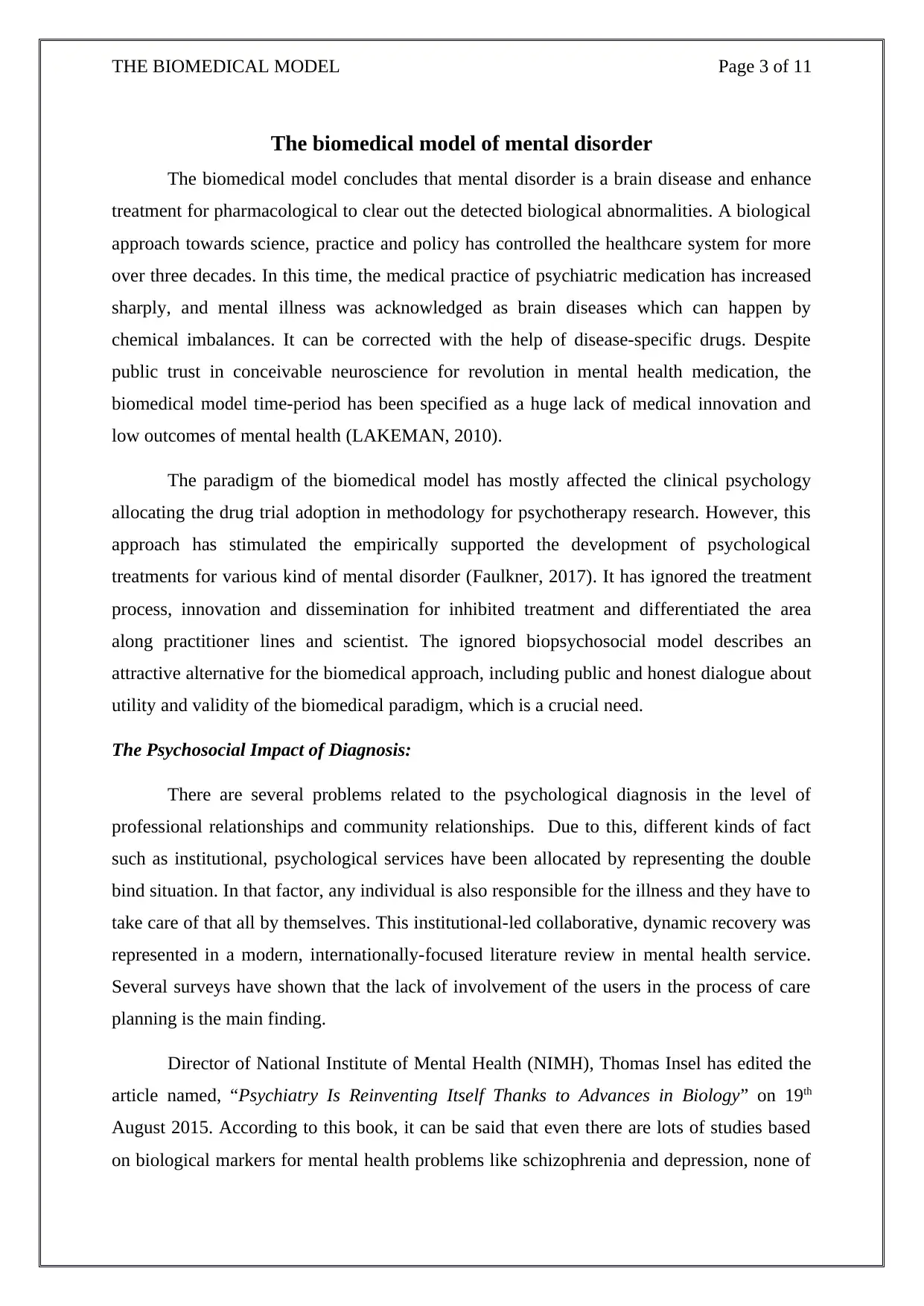
THE BIOMEDICAL MODEL Page 3 of 11
The biomedical model of mental disorder
The biomedical model concludes that mental disorder is a brain disease and enhance
treatment for pharmacological to clear out the detected biological abnormalities. A biological
approach towards science, practice and policy has controlled the healthcare system for more
over three decades. In this time, the medical practice of psychiatric medication has increased
sharply, and mental illness was acknowledged as brain diseases which can happen by
chemical imbalances. It can be corrected with the help of disease-specific drugs. Despite
public trust in conceivable neuroscience for revolution in mental health medication, the
biomedical model time-period has been specified as a huge lack of medical innovation and
low outcomes of mental health (LAKEMAN, 2010).
The paradigm of the biomedical model has mostly affected the clinical psychology
allocating the drug trial adoption in methodology for psychotherapy research. However, this
approach has stimulated the empirically supported the development of psychological
treatments for various kind of mental disorder (Faulkner, 2017). It has ignored the treatment
process, innovation and dissemination for inhibited treatment and differentiated the area
along practitioner lines and scientist. The ignored biopsychosocial model describes an
attractive alternative for the biomedical approach, including public and honest dialogue about
utility and validity of the biomedical paradigm, which is a crucial need.
The Psychosocial Impact of Diagnosis:
There are several problems related to the psychological diagnosis in the level of
professional relationships and community relationships. Due to this, different kinds of fact
such as institutional, psychological services have been allocated by representing the double
bind situation. In that factor, any individual is also responsible for the illness and they have to
take care of that all by themselves. This institutional-led collaborative, dynamic recovery was
represented in a modern, internationally-focused literature review in mental health service.
Several surveys have shown that the lack of involvement of the users in the process of care
planning is the main finding.
Director of National Institute of Mental Health (NIMH), Thomas Insel has edited the
article named, “Psychiatry Is Reinventing Itself Thanks to Advances in Biology” on 19th
August 2015. According to this book, it can be said that even there are lots of studies based
on biological markers for mental health problems like schizophrenia and depression, none of
The biomedical model of mental disorder
The biomedical model concludes that mental disorder is a brain disease and enhance
treatment for pharmacological to clear out the detected biological abnormalities. A biological
approach towards science, practice and policy has controlled the healthcare system for more
over three decades. In this time, the medical practice of psychiatric medication has increased
sharply, and mental illness was acknowledged as brain diseases which can happen by
chemical imbalances. It can be corrected with the help of disease-specific drugs. Despite
public trust in conceivable neuroscience for revolution in mental health medication, the
biomedical model time-period has been specified as a huge lack of medical innovation and
low outcomes of mental health (LAKEMAN, 2010).
The paradigm of the biomedical model has mostly affected the clinical psychology
allocating the drug trial adoption in methodology for psychotherapy research. However, this
approach has stimulated the empirically supported the development of psychological
treatments for various kind of mental disorder (Faulkner, 2017). It has ignored the treatment
process, innovation and dissemination for inhibited treatment and differentiated the area
along practitioner lines and scientist. The ignored biopsychosocial model describes an
attractive alternative for the biomedical approach, including public and honest dialogue about
utility and validity of the biomedical paradigm, which is a crucial need.
The Psychosocial Impact of Diagnosis:
There are several problems related to the psychological diagnosis in the level of
professional relationships and community relationships. Due to this, different kinds of fact
such as institutional, psychological services have been allocated by representing the double
bind situation. In that factor, any individual is also responsible for the illness and they have to
take care of that all by themselves. This institutional-led collaborative, dynamic recovery was
represented in a modern, internationally-focused literature review in mental health service.
Several surveys have shown that the lack of involvement of the users in the process of care
planning is the main finding.
Director of National Institute of Mental Health (NIMH), Thomas Insel has edited the
article named, “Psychiatry Is Reinventing Itself Thanks to Advances in Biology” on 19th
August 2015. According to this book, it can be said that even there are lots of studies based
on biological markers for mental health problems like schizophrenia and depression, none of
⊘ This is a preview!⊘
Do you want full access?
Subscribe today to unlock all pages.

Trusted by 1+ million students worldwide
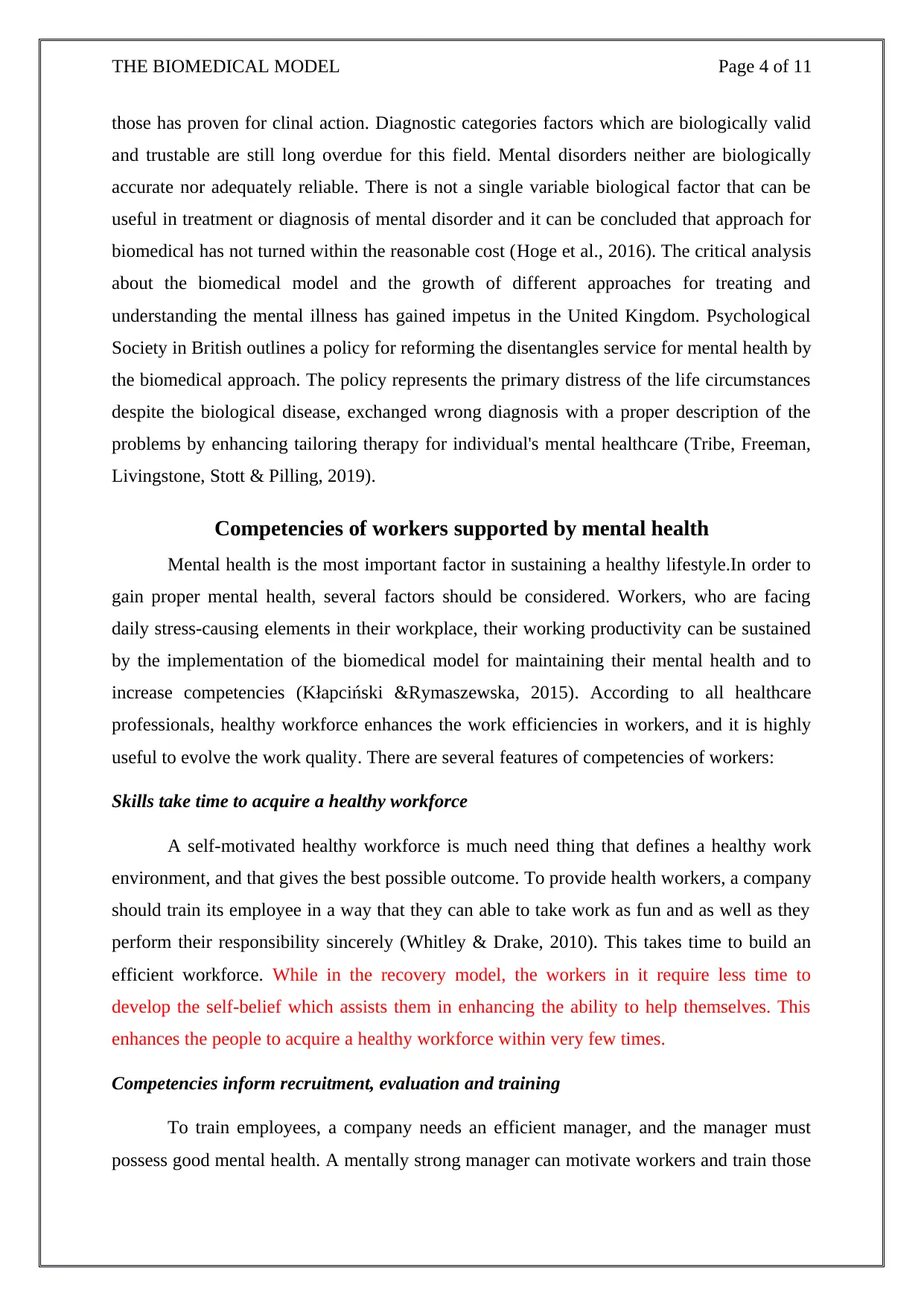
THE BIOMEDICAL MODEL Page 4 of 11
those has proven for clinal action. Diagnostic categories factors which are biologically valid
and trustable are still long overdue for this field. Mental disorders neither are biologically
accurate nor adequately reliable. There is not a single variable biological factor that can be
useful in treatment or diagnosis of mental disorder and it can be concluded that approach for
biomedical has not turned within the reasonable cost (Hoge et al., 2016). The critical analysis
about the biomedical model and the growth of different approaches for treating and
understanding the mental illness has gained impetus in the United Kingdom. Psychological
Society in British outlines a policy for reforming the disentangles service for mental health by
the biomedical approach. The policy represents the primary distress of the life circumstances
despite the biological disease, exchanged wrong diagnosis with a proper description of the
problems by enhancing tailoring therapy for individual's mental healthcare (Tribe, Freeman,
Livingstone, Stott & Pilling, 2019).
Competencies of workers supported by mental health
Mental health is the most important factor in sustaining a healthy lifestyle.In order to
gain proper mental health, several factors should be considered. Workers, who are facing
daily stress-causing elements in their workplace, their working productivity can be sustained
by the implementation of the biomedical model for maintaining their mental health and to
increase competencies (Kłapciński &Rymaszewska, 2015). According to all healthcare
professionals, healthy workforce enhances the work efficiencies in workers, and it is highly
useful to evolve the work quality. There are several features of competencies of workers:
Skills take time to acquire a healthy workforce
A self-motivated healthy workforce is much need thing that defines a healthy work
environment, and that gives the best possible outcome. To provide health workers, a company
should train its employee in a way that they can able to take work as fun and as well as they
perform their responsibility sincerely (Whitley & Drake, 2010). This takes time to build an
efficient workforce. While in the recovery model, the workers in it require less time to
develop the self-belief which assists them in enhancing the ability to help themselves. This
enhances the people to acquire a healthy workforce within very few times.
Competencies inform recruitment, evaluation and training
To train employees, a company needs an efficient manager, and the manager must
possess good mental health. A mentally strong manager can motivate workers and train those
those has proven for clinal action. Diagnostic categories factors which are biologically valid
and trustable are still long overdue for this field. Mental disorders neither are biologically
accurate nor adequately reliable. There is not a single variable biological factor that can be
useful in treatment or diagnosis of mental disorder and it can be concluded that approach for
biomedical has not turned within the reasonable cost (Hoge et al., 2016). The critical analysis
about the biomedical model and the growth of different approaches for treating and
understanding the mental illness has gained impetus in the United Kingdom. Psychological
Society in British outlines a policy for reforming the disentangles service for mental health by
the biomedical approach. The policy represents the primary distress of the life circumstances
despite the biological disease, exchanged wrong diagnosis with a proper description of the
problems by enhancing tailoring therapy for individual's mental healthcare (Tribe, Freeman,
Livingstone, Stott & Pilling, 2019).
Competencies of workers supported by mental health
Mental health is the most important factor in sustaining a healthy lifestyle.In order to
gain proper mental health, several factors should be considered. Workers, who are facing
daily stress-causing elements in their workplace, their working productivity can be sustained
by the implementation of the biomedical model for maintaining their mental health and to
increase competencies (Kłapciński &Rymaszewska, 2015). According to all healthcare
professionals, healthy workforce enhances the work efficiencies in workers, and it is highly
useful to evolve the work quality. There are several features of competencies of workers:
Skills take time to acquire a healthy workforce
A self-motivated healthy workforce is much need thing that defines a healthy work
environment, and that gives the best possible outcome. To provide health workers, a company
should train its employee in a way that they can able to take work as fun and as well as they
perform their responsibility sincerely (Whitley & Drake, 2010). This takes time to build an
efficient workforce. While in the recovery model, the workers in it require less time to
develop the self-belief which assists them in enhancing the ability to help themselves. This
enhances the people to acquire a healthy workforce within very few times.
Competencies inform recruitment, evaluation and training
To train employees, a company needs an efficient manager, and the manager must
possess good mental health. A mentally strong manager can motivate workers and train those
Paraphrase This Document
Need a fresh take? Get an instant paraphrase of this document with our AI Paraphraser
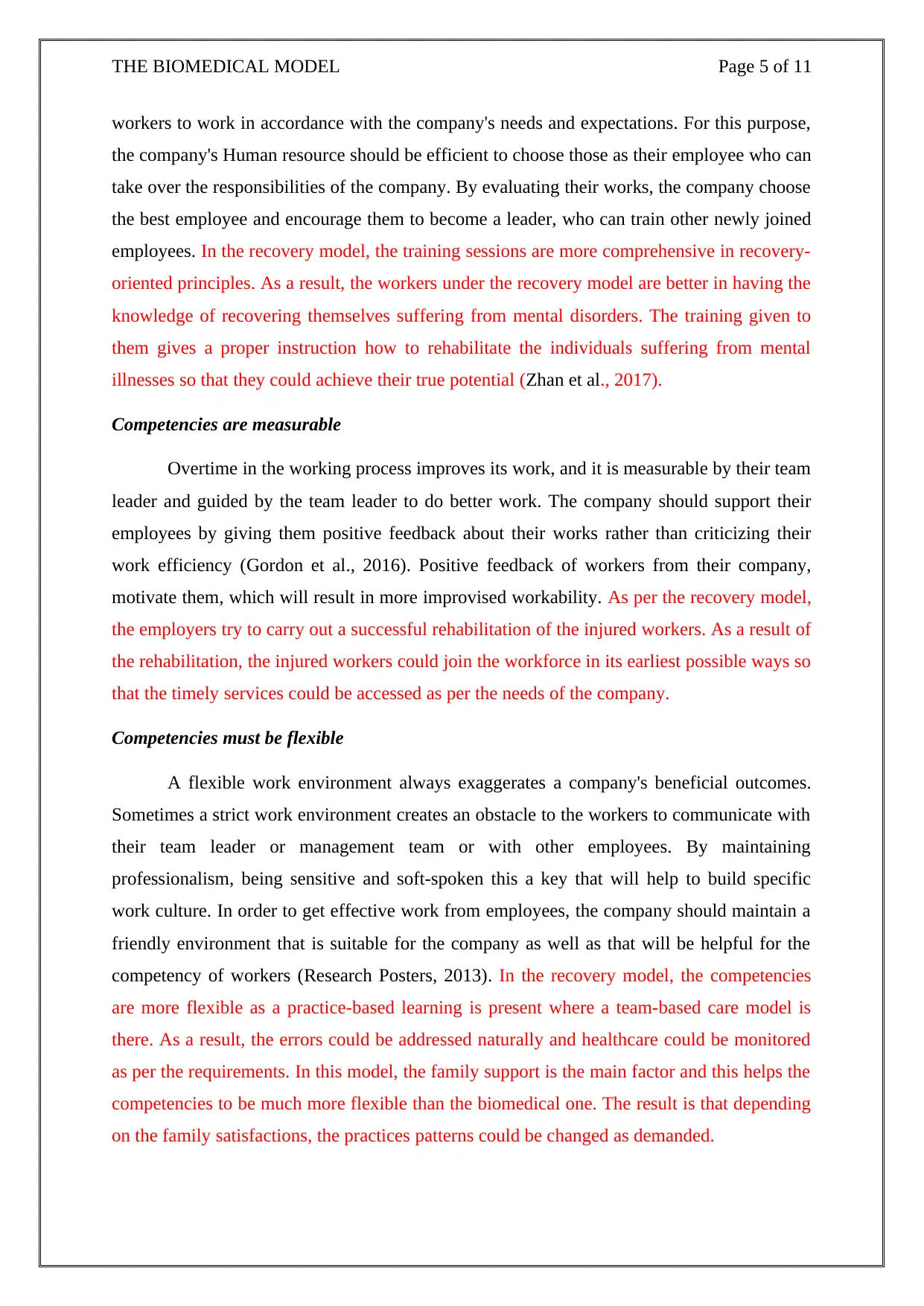
THE BIOMEDICAL MODEL Page 5 of 11
workers to work in accordance with the company's needs and expectations. For this purpose,
the company's Human resource should be efficient to choose those as their employee who can
take over the responsibilities of the company. By evaluating their works, the company choose
the best employee and encourage them to become a leader, who can train other newly joined
employees. In the recovery model, the training sessions are more comprehensive in recovery-
oriented principles. As a result, the workers under the recovery model are better in having the
knowledge of recovering themselves suffering from mental disorders. The training given to
them gives a proper instruction how to rehabilitate the individuals suffering from mental
illnesses so that they could achieve their true potential (Zhan et al., 2017).
Competencies are measurable
Overtime in the working process improves its work, and it is measurable by their team
leader and guided by the team leader to do better work. The company should support their
employees by giving them positive feedback about their works rather than criticizing their
work efficiency (Gordon et al., 2016). Positive feedback of workers from their company,
motivate them, which will result in more improvised workability. As per the recovery model,
the employers try to carry out a successful rehabilitation of the injured workers. As a result of
the rehabilitation, the injured workers could join the workforce in its earliest possible ways so
that the timely services could be accessed as per the needs of the company.
Competencies must be flexible
A flexible work environment always exaggerates a company's beneficial outcomes.
Sometimes a strict work environment creates an obstacle to the workers to communicate with
their team leader or management team or with other employees. By maintaining
professionalism, being sensitive and soft-spoken this a key that will help to build specific
work culture. In order to get effective work from employees, the company should maintain a
friendly environment that is suitable for the company as well as that will be helpful for the
competency of workers (Research Posters, 2013). In the recovery model, the competencies
are more flexible as a practice-based learning is present where a team-based care model is
there. As a result, the errors could be addressed naturally and healthcare could be monitored
as per the requirements. In this model, the family support is the main factor and this helps the
competencies to be much more flexible than the biomedical one. The result is that depending
on the family satisfactions, the practices patterns could be changed as demanded.
workers to work in accordance with the company's needs and expectations. For this purpose,
the company's Human resource should be efficient to choose those as their employee who can
take over the responsibilities of the company. By evaluating their works, the company choose
the best employee and encourage them to become a leader, who can train other newly joined
employees. In the recovery model, the training sessions are more comprehensive in recovery-
oriented principles. As a result, the workers under the recovery model are better in having the
knowledge of recovering themselves suffering from mental disorders. The training given to
them gives a proper instruction how to rehabilitate the individuals suffering from mental
illnesses so that they could achieve their true potential (Zhan et al., 2017).
Competencies are measurable
Overtime in the working process improves its work, and it is measurable by their team
leader and guided by the team leader to do better work. The company should support their
employees by giving them positive feedback about their works rather than criticizing their
work efficiency (Gordon et al., 2016). Positive feedback of workers from their company,
motivate them, which will result in more improvised workability. As per the recovery model,
the employers try to carry out a successful rehabilitation of the injured workers. As a result of
the rehabilitation, the injured workers could join the workforce in its earliest possible ways so
that the timely services could be accessed as per the needs of the company.
Competencies must be flexible
A flexible work environment always exaggerates a company's beneficial outcomes.
Sometimes a strict work environment creates an obstacle to the workers to communicate with
their team leader or management team or with other employees. By maintaining
professionalism, being sensitive and soft-spoken this a key that will help to build specific
work culture. In order to get effective work from employees, the company should maintain a
friendly environment that is suitable for the company as well as that will be helpful for the
competency of workers (Research Posters, 2013). In the recovery model, the competencies
are more flexible as a practice-based learning is present where a team-based care model is
there. As a result, the errors could be addressed naturally and healthcare could be monitored
as per the requirements. In this model, the family support is the main factor and this helps the
competencies to be much more flexible than the biomedical one. The result is that depending
on the family satisfactions, the practices patterns could be changed as demanded.
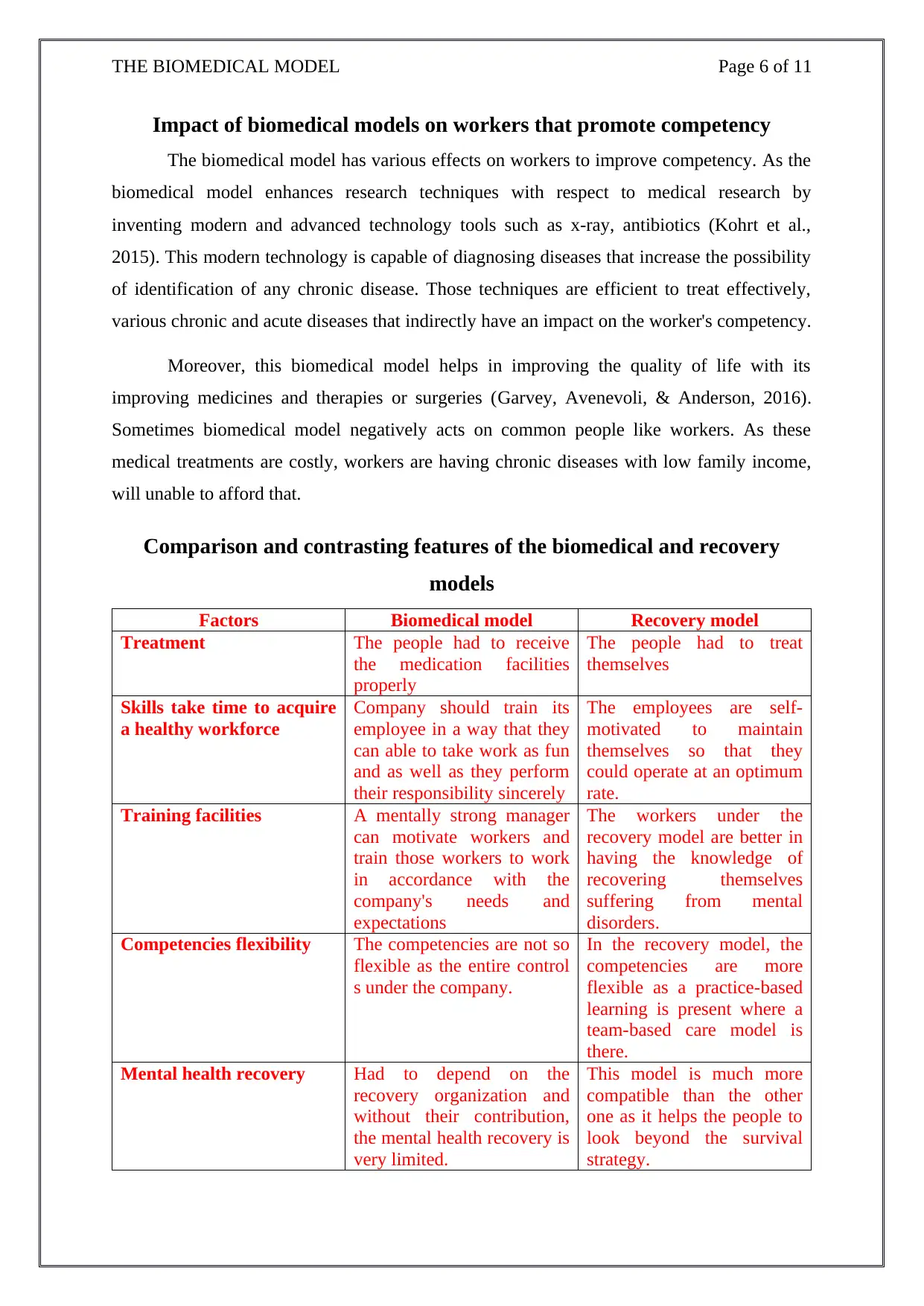
THE BIOMEDICAL MODEL Page 6 of 11
Impact of biomedical models on workers that promote competency
The biomedical model has various effects on workers to improve competency. As the
biomedical model enhances research techniques with respect to medical research by
inventing modern and advanced technology tools such as x-ray, antibiotics (Kohrt et al.,
2015). This modern technology is capable of diagnosing diseases that increase the possibility
of identification of any chronic disease. Those techniques are efficient to treat effectively,
various chronic and acute diseases that indirectly have an impact on the worker's competency.
Moreover, this biomedical model helps in improving the quality of life with its
improving medicines and therapies or surgeries (Garvey, Avenevoli, & Anderson, 2016).
Sometimes biomedical model negatively acts on common people like workers. As these
medical treatments are costly, workers are having chronic diseases with low family income,
will unable to afford that.
Comparison and contrasting features of the biomedical and recovery
models
Factors Biomedical model Recovery model
Treatment The people had to receive
the medication facilities
properly
The people had to treat
themselves
Skills take time to acquire
a healthy workforce
Company should train its
employee in a way that they
can able to take work as fun
and as well as they perform
their responsibility sincerely
The employees are self-
motivated to maintain
themselves so that they
could operate at an optimum
rate.
Training facilities A mentally strong manager
can motivate workers and
train those workers to work
in accordance with the
company's needs and
expectations
The workers under the
recovery model are better in
having the knowledge of
recovering themselves
suffering from mental
disorders.
Competencies flexibility The competencies are not so
flexible as the entire control
s under the company.
In the recovery model, the
competencies are more
flexible as a practice-based
learning is present where a
team-based care model is
there.
Mental health recovery Had to depend on the
recovery organization and
without their contribution,
the mental health recovery is
very limited.
This model is much more
compatible than the other
one as it helps the people to
look beyond the survival
strategy.
Impact of biomedical models on workers that promote competency
The biomedical model has various effects on workers to improve competency. As the
biomedical model enhances research techniques with respect to medical research by
inventing modern and advanced technology tools such as x-ray, antibiotics (Kohrt et al.,
2015). This modern technology is capable of diagnosing diseases that increase the possibility
of identification of any chronic disease. Those techniques are efficient to treat effectively,
various chronic and acute diseases that indirectly have an impact on the worker's competency.
Moreover, this biomedical model helps in improving the quality of life with its
improving medicines and therapies or surgeries (Garvey, Avenevoli, & Anderson, 2016).
Sometimes biomedical model negatively acts on common people like workers. As these
medical treatments are costly, workers are having chronic diseases with low family income,
will unable to afford that.
Comparison and contrasting features of the biomedical and recovery
models
Factors Biomedical model Recovery model
Treatment The people had to receive
the medication facilities
properly
The people had to treat
themselves
Skills take time to acquire
a healthy workforce
Company should train its
employee in a way that they
can able to take work as fun
and as well as they perform
their responsibility sincerely
The employees are self-
motivated to maintain
themselves so that they
could operate at an optimum
rate.
Training facilities A mentally strong manager
can motivate workers and
train those workers to work
in accordance with the
company's needs and
expectations
The workers under the
recovery model are better in
having the knowledge of
recovering themselves
suffering from mental
disorders.
Competencies flexibility The competencies are not so
flexible as the entire control
s under the company.
In the recovery model, the
competencies are more
flexible as a practice-based
learning is present where a
team-based care model is
there.
Mental health recovery Had to depend on the
recovery organization and
without their contribution,
the mental health recovery is
very limited.
This model is much more
compatible than the other
one as it helps the people to
look beyond the survival
strategy.
⊘ This is a preview!⊘
Do you want full access?
Subscribe today to unlock all pages.

Trusted by 1+ million students worldwide
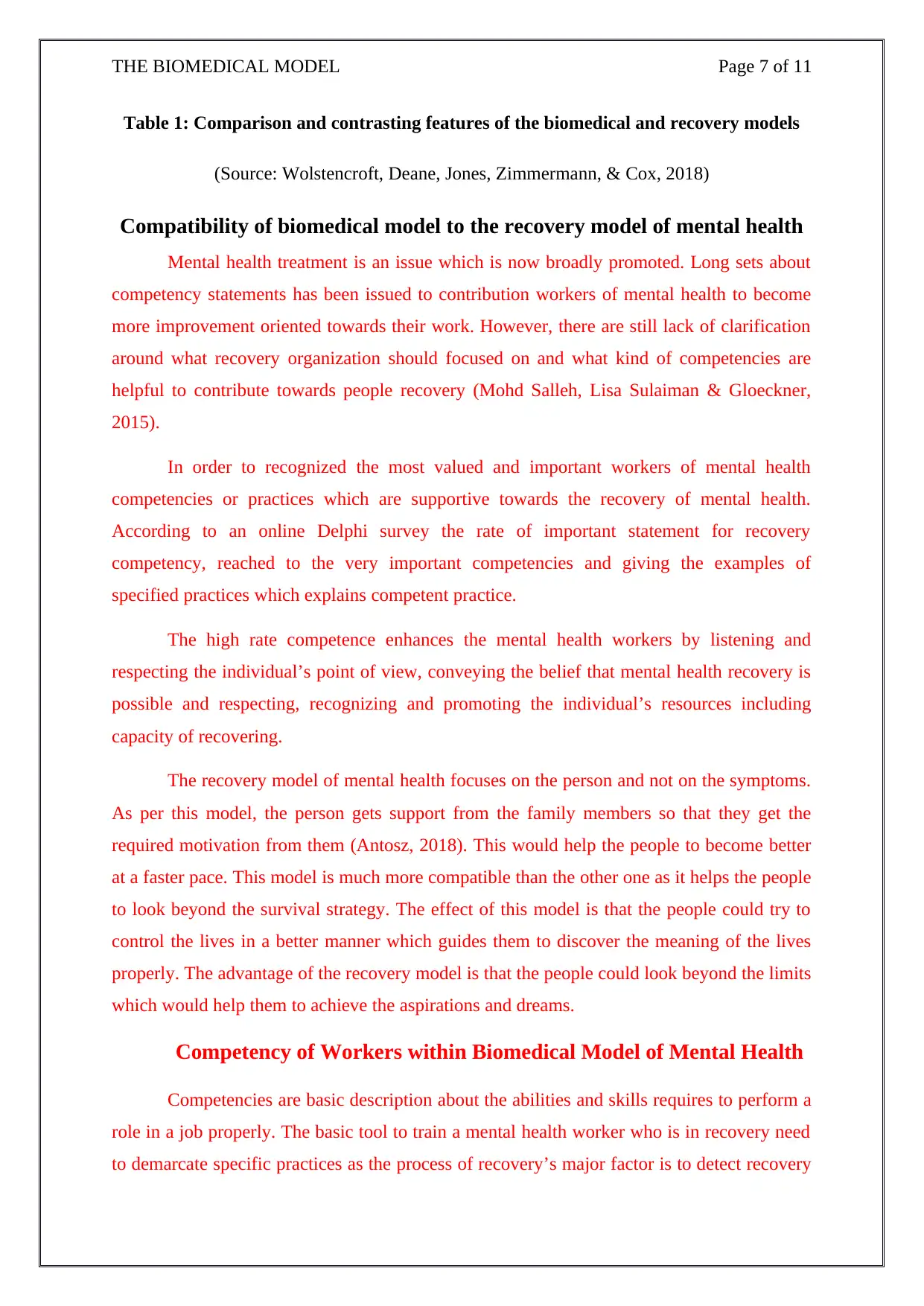
THE BIOMEDICAL MODEL Page 7 of 11
Table 1: Comparison and contrasting features of the biomedical and recovery models
(Source: Wolstencroft, Deane, Jones, Zimmermann, & Cox, 2018)
Compatibility of biomedical model to the recovery model of mental health
Mental health treatment is an issue which is now broadly promoted. Long sets about
competency statements has been issued to contribution workers of mental health to become
more improvement oriented towards their work. However, there are still lack of clarification
around what recovery organization should focused on and what kind of competencies are
helpful to contribute towards people recovery (Mohd Salleh, Lisa Sulaiman & Gloeckner,
2015).
In order to recognized the most valued and important workers of mental health
competencies or practices which are supportive towards the recovery of mental health.
According to an online Delphi survey the rate of important statement for recovery
competency, reached to the very important competencies and giving the examples of
specified practices which explains competent practice.
The high rate competence enhances the mental health workers by listening and
respecting the individual’s point of view, conveying the belief that mental health recovery is
possible and respecting, recognizing and promoting the individual’s resources including
capacity of recovering.
The recovery model of mental health focuses on the person and not on the symptoms.
As per this model, the person gets support from the family members so that they get the
required motivation from them (Antosz, 2018). This would help the people to become better
at a faster pace. This model is much more compatible than the other one as it helps the people
to look beyond the survival strategy. The effect of this model is that the people could try to
control the lives in a better manner which guides them to discover the meaning of the lives
properly. The advantage of the recovery model is that the people could look beyond the limits
which would help them to achieve the aspirations and dreams.
Competency of Workers within Biomedical Model of Mental Health
Competencies are basic description about the abilities and skills requires to perform a
role in a job properly. The basic tool to train a mental health worker who is in recovery need
to demarcate specific practices as the process of recovery’s major factor is to detect recovery
Table 1: Comparison and contrasting features of the biomedical and recovery models
(Source: Wolstencroft, Deane, Jones, Zimmermann, & Cox, 2018)
Compatibility of biomedical model to the recovery model of mental health
Mental health treatment is an issue which is now broadly promoted. Long sets about
competency statements has been issued to contribution workers of mental health to become
more improvement oriented towards their work. However, there are still lack of clarification
around what recovery organization should focused on and what kind of competencies are
helpful to contribute towards people recovery (Mohd Salleh, Lisa Sulaiman & Gloeckner,
2015).
In order to recognized the most valued and important workers of mental health
competencies or practices which are supportive towards the recovery of mental health.
According to an online Delphi survey the rate of important statement for recovery
competency, reached to the very important competencies and giving the examples of
specified practices which explains competent practice.
The high rate competence enhances the mental health workers by listening and
respecting the individual’s point of view, conveying the belief that mental health recovery is
possible and respecting, recognizing and promoting the individual’s resources including
capacity of recovering.
The recovery model of mental health focuses on the person and not on the symptoms.
As per this model, the person gets support from the family members so that they get the
required motivation from them (Antosz, 2018). This would help the people to become better
at a faster pace. This model is much more compatible than the other one as it helps the people
to look beyond the survival strategy. The effect of this model is that the people could try to
control the lives in a better manner which guides them to discover the meaning of the lives
properly. The advantage of the recovery model is that the people could look beyond the limits
which would help them to achieve the aspirations and dreams.
Competency of Workers within Biomedical Model of Mental Health
Competencies are basic description about the abilities and skills requires to perform a
role in a job properly. The basic tool to train a mental health worker who is in recovery need
to demarcate specific practices as the process of recovery’s major factor is to detect recovery
Paraphrase This Document
Need a fresh take? Get an instant paraphrase of this document with our AI Paraphraser
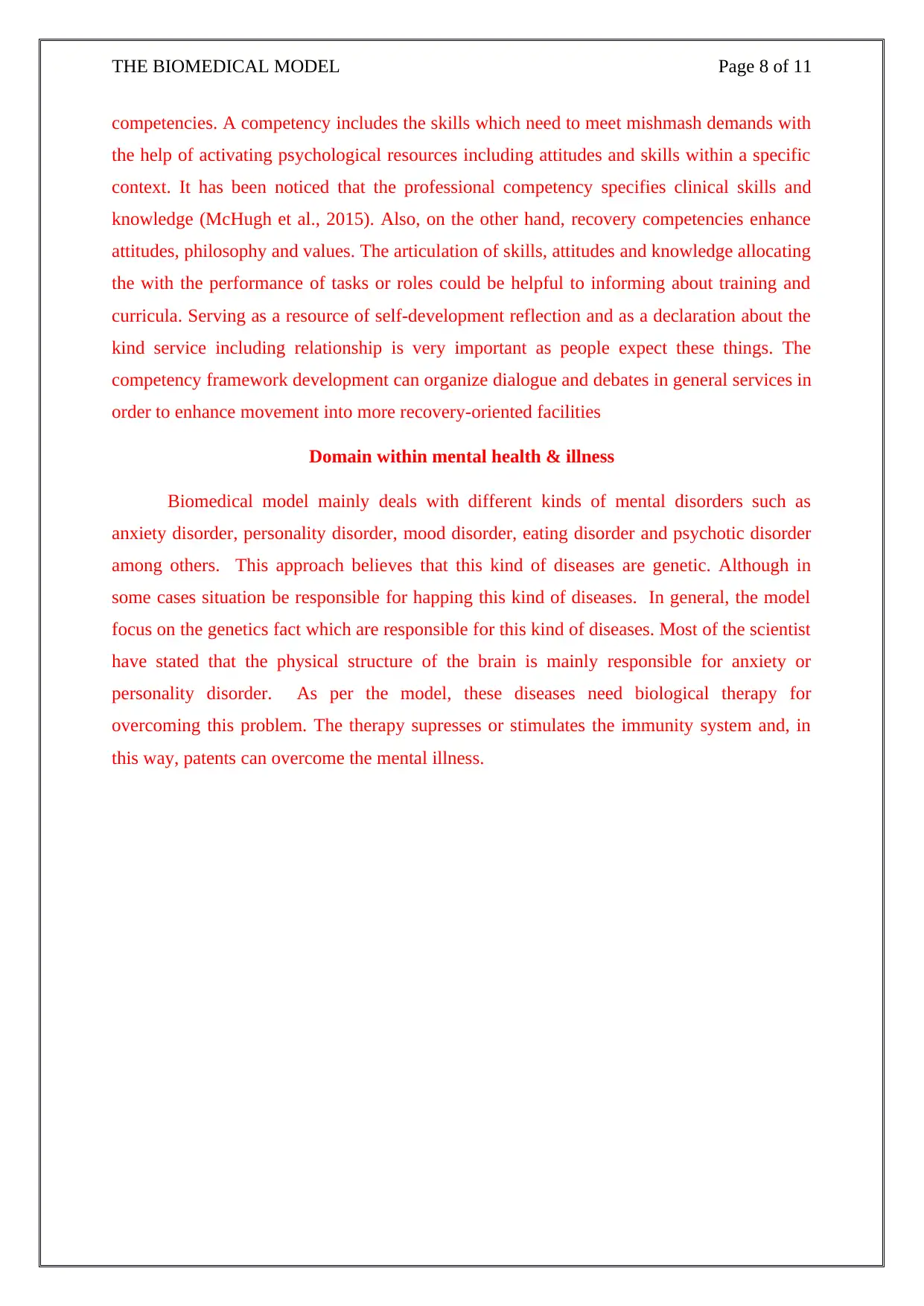
THE BIOMEDICAL MODEL Page 8 of 11
competencies. A competency includes the skills which need to meet mishmash demands with
the help of activating psychological resources including attitudes and skills within a specific
context. It has been noticed that the professional competency specifies clinical skills and
knowledge (McHugh et al., 2015). Also, on the other hand, recovery competencies enhance
attitudes, philosophy and values. The articulation of skills, attitudes and knowledge allocating
the with the performance of tasks or roles could be helpful to informing about training and
curricula. Serving as a resource of self-development reflection and as a declaration about the
kind service including relationship is very important as people expect these things. The
competency framework development can organize dialogue and debates in general services in
order to enhance movement into more recovery-oriented facilities
Domain within mental health & illness
Biomedical model mainly deals with different kinds of mental disorders such as
anxiety disorder, personality disorder, mood disorder, eating disorder and psychotic disorder
among others. This approach believes that this kind of diseases are genetic. Although in
some cases situation be responsible for happing this kind of diseases. In general, the model
focus on the genetics fact which are responsible for this kind of diseases. Most of the scientist
have stated that the physical structure of the brain is mainly responsible for anxiety or
personality disorder. As per the model, these diseases need biological therapy for
overcoming this problem. The therapy supresses or stimulates the immunity system and, in
this way, patents can overcome the mental illness.
competencies. A competency includes the skills which need to meet mishmash demands with
the help of activating psychological resources including attitudes and skills within a specific
context. It has been noticed that the professional competency specifies clinical skills and
knowledge (McHugh et al., 2015). Also, on the other hand, recovery competencies enhance
attitudes, philosophy and values. The articulation of skills, attitudes and knowledge allocating
the with the performance of tasks or roles could be helpful to informing about training and
curricula. Serving as a resource of self-development reflection and as a declaration about the
kind service including relationship is very important as people expect these things. The
competency framework development can organize dialogue and debates in general services in
order to enhance movement into more recovery-oriented facilities
Domain within mental health & illness
Biomedical model mainly deals with different kinds of mental disorders such as
anxiety disorder, personality disorder, mood disorder, eating disorder and psychotic disorder
among others. This approach believes that this kind of diseases are genetic. Although in
some cases situation be responsible for happing this kind of diseases. In general, the model
focus on the genetics fact which are responsible for this kind of diseases. Most of the scientist
have stated that the physical structure of the brain is mainly responsible for anxiety or
personality disorder. As per the model, these diseases need biological therapy for
overcoming this problem. The therapy supresses or stimulates the immunity system and, in
this way, patents can overcome the mental illness.
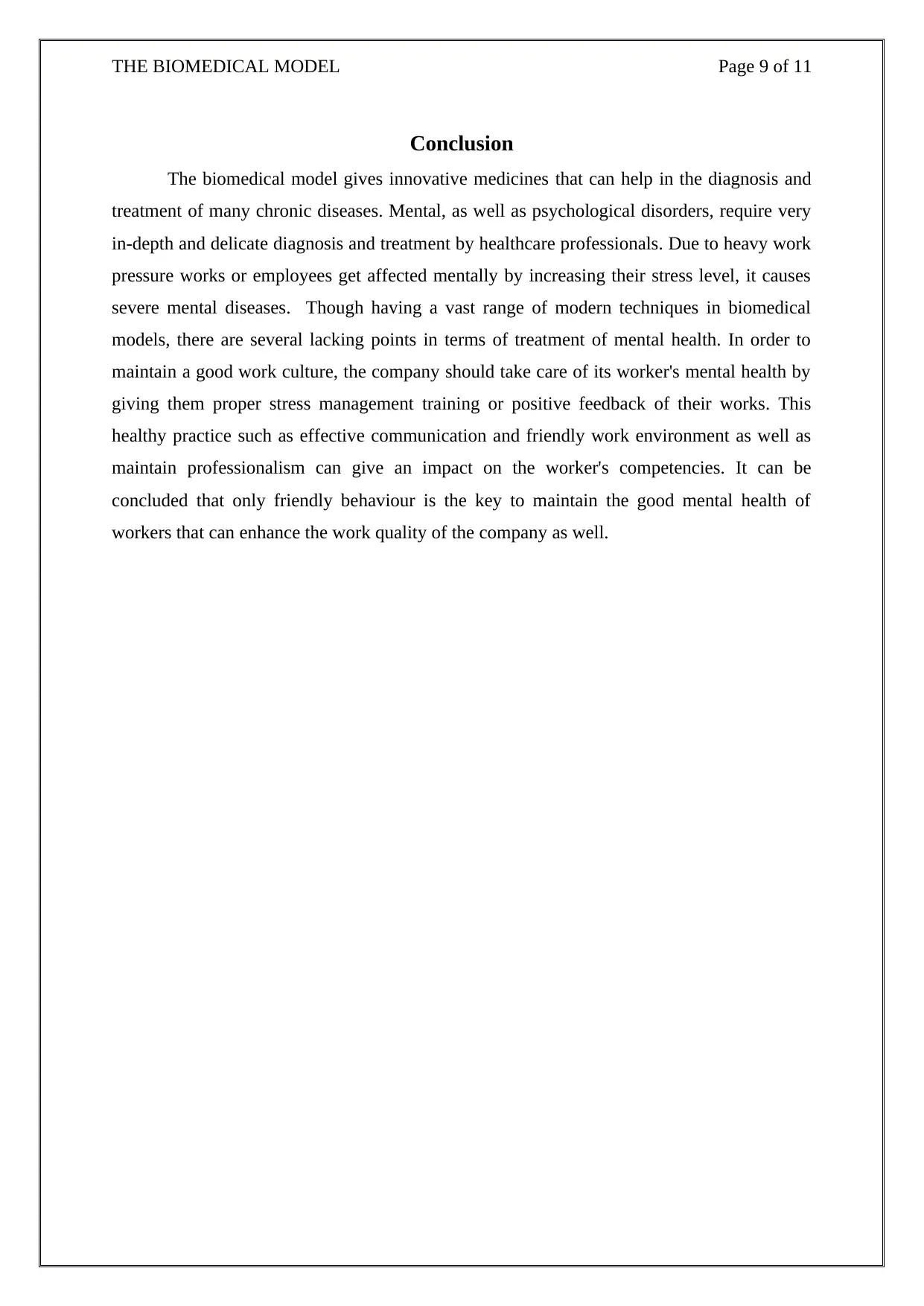
THE BIOMEDICAL MODEL Page 9 of 11
Conclusion
The biomedical model gives innovative medicines that can help in the diagnosis and
treatment of many chronic diseases. Mental, as well as psychological disorders, require very
in-depth and delicate diagnosis and treatment by healthcare professionals. Due to heavy work
pressure works or employees get affected mentally by increasing their stress level, it causes
severe mental diseases. Though having a vast range of modern techniques in biomedical
models, there are several lacking points in terms of treatment of mental health. In order to
maintain a good work culture, the company should take care of its worker's mental health by
giving them proper stress management training or positive feedback of their works. This
healthy practice such as effective communication and friendly work environment as well as
maintain professionalism can give an impact on the worker's competencies. It can be
concluded that only friendly behaviour is the key to maintain the good mental health of
workers that can enhance the work quality of the company as well.
Conclusion
The biomedical model gives innovative medicines that can help in the diagnosis and
treatment of many chronic diseases. Mental, as well as psychological disorders, require very
in-depth and delicate diagnosis and treatment by healthcare professionals. Due to heavy work
pressure works or employees get affected mentally by increasing their stress level, it causes
severe mental diseases. Though having a vast range of modern techniques in biomedical
models, there are several lacking points in terms of treatment of mental health. In order to
maintain a good work culture, the company should take care of its worker's mental health by
giving them proper stress management training or positive feedback of their works. This
healthy practice such as effective communication and friendly work environment as well as
maintain professionalism can give an impact on the worker's competencies. It can be
concluded that only friendly behaviour is the key to maintain the good mental health of
workers that can enhance the work quality of the company as well.
⊘ This is a preview!⊘
Do you want full access?
Subscribe today to unlock all pages.

Trusted by 1+ million students worldwide
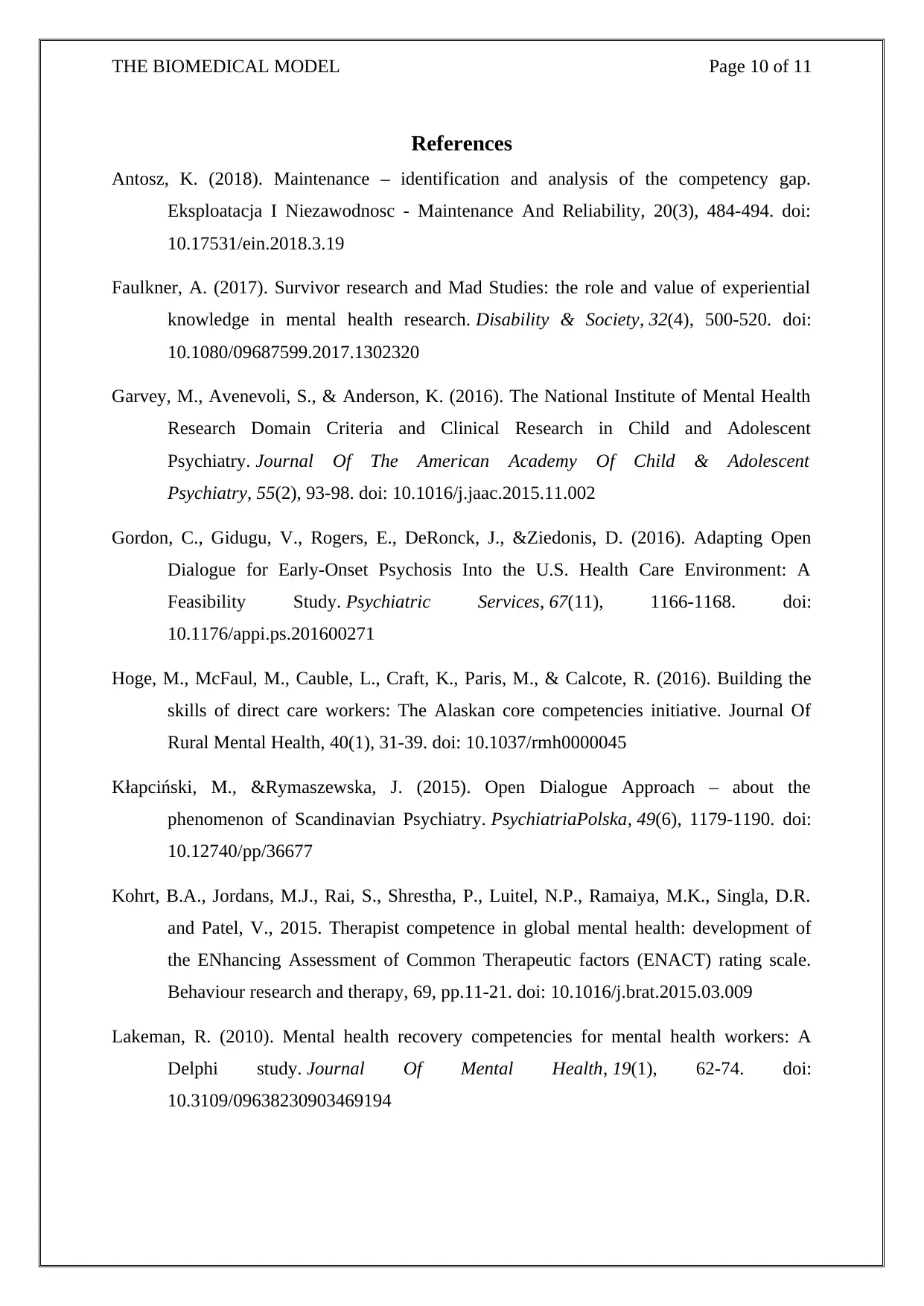
THE BIOMEDICAL MODEL Page 10 of 11
References
Antosz, K. (2018). Maintenance – identification and analysis of the competency gap.
Eksploatacja I Niezawodnosc - Maintenance And Reliability, 20(3), 484-494. doi:
10.17531/ein.2018.3.19
Faulkner, A. (2017). Survivor research and Mad Studies: the role and value of experiential
knowledge in mental health research. Disability & Society, 32(4), 500-520. doi:
10.1080/09687599.2017.1302320
Garvey, M., Avenevoli, S., & Anderson, K. (2016). The National Institute of Mental Health
Research Domain Criteria and Clinical Research in Child and Adolescent
Psychiatry. Journal Of The American Academy Of Child & Adolescent
Psychiatry, 55(2), 93-98. doi: 10.1016/j.jaac.2015.11.002
Gordon, C., Gidugu, V., Rogers, E., DeRonck, J., &Ziedonis, D. (2016). Adapting Open
Dialogue for Early-Onset Psychosis Into the U.S. Health Care Environment: A
Feasibility Study. Psychiatric Services, 67(11), 1166-1168. doi:
10.1176/appi.ps.201600271
Hoge, M., McFaul, M., Cauble, L., Craft, K., Paris, M., & Calcote, R. (2016). Building the
skills of direct care workers: The Alaskan core competencies initiative. Journal Of
Rural Mental Health, 40(1), 31-39. doi: 10.1037/rmh0000045
Kłapciński, M., &Rymaszewska, J. (2015). Open Dialogue Approach – about the
phenomenon of Scandinavian Psychiatry. PsychiatriaPolska, 49(6), 1179-1190. doi:
10.12740/pp/36677
Kohrt, B.A., Jordans, M.J., Rai, S., Shrestha, P., Luitel, N.P., Ramaiya, M.K., Singla, D.R.
and Patel, V., 2015. Therapist competence in global mental health: development of
the ENhancing Assessment of Common Therapeutic factors (ENACT) rating scale.
Behaviour research and therapy, 69, pp.11-21. doi: 10.1016/j.brat.2015.03.009
Lakeman, R. (2010). Mental health recovery competencies for mental health workers: A
Delphi study. Journal Of Mental Health, 19(1), 62-74. doi:
10.3109/09638230903469194
References
Antosz, K. (2018). Maintenance – identification and analysis of the competency gap.
Eksploatacja I Niezawodnosc - Maintenance And Reliability, 20(3), 484-494. doi:
10.17531/ein.2018.3.19
Faulkner, A. (2017). Survivor research and Mad Studies: the role and value of experiential
knowledge in mental health research. Disability & Society, 32(4), 500-520. doi:
10.1080/09687599.2017.1302320
Garvey, M., Avenevoli, S., & Anderson, K. (2016). The National Institute of Mental Health
Research Domain Criteria and Clinical Research in Child and Adolescent
Psychiatry. Journal Of The American Academy Of Child & Adolescent
Psychiatry, 55(2), 93-98. doi: 10.1016/j.jaac.2015.11.002
Gordon, C., Gidugu, V., Rogers, E., DeRonck, J., &Ziedonis, D. (2016). Adapting Open
Dialogue for Early-Onset Psychosis Into the U.S. Health Care Environment: A
Feasibility Study. Psychiatric Services, 67(11), 1166-1168. doi:
10.1176/appi.ps.201600271
Hoge, M., McFaul, M., Cauble, L., Craft, K., Paris, M., & Calcote, R. (2016). Building the
skills of direct care workers: The Alaskan core competencies initiative. Journal Of
Rural Mental Health, 40(1), 31-39. doi: 10.1037/rmh0000045
Kłapciński, M., &Rymaszewska, J. (2015). Open Dialogue Approach – about the
phenomenon of Scandinavian Psychiatry. PsychiatriaPolska, 49(6), 1179-1190. doi:
10.12740/pp/36677
Kohrt, B.A., Jordans, M.J., Rai, S., Shrestha, P., Luitel, N.P., Ramaiya, M.K., Singla, D.R.
and Patel, V., 2015. Therapist competence in global mental health: development of
the ENhancing Assessment of Common Therapeutic factors (ENACT) rating scale.
Behaviour research and therapy, 69, pp.11-21. doi: 10.1016/j.brat.2015.03.009
Lakeman, R. (2010). Mental health recovery competencies for mental health workers: A
Delphi study. Journal Of Mental Health, 19(1), 62-74. doi:
10.3109/09638230903469194
Paraphrase This Document
Need a fresh take? Get an instant paraphrase of this document with our AI Paraphraser
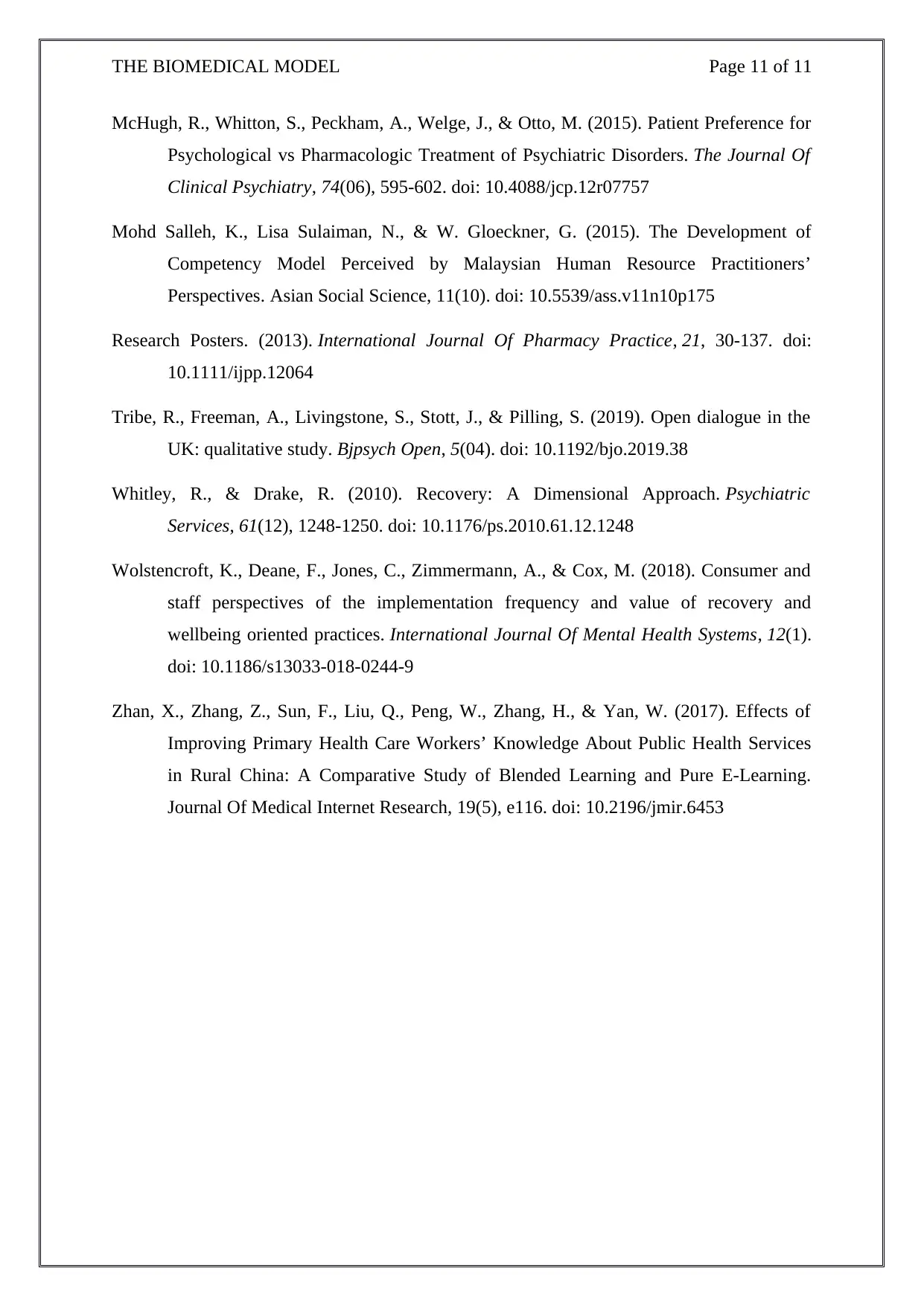
THE BIOMEDICAL MODEL Page 11 of 11
McHugh, R., Whitton, S., Peckham, A., Welge, J., & Otto, M. (2015). Patient Preference for
Psychological vs Pharmacologic Treatment of Psychiatric Disorders. The Journal Of
Clinical Psychiatry, 74(06), 595-602. doi: 10.4088/jcp.12r07757
Mohd Salleh, K., Lisa Sulaiman, N., & W. Gloeckner, G. (2015). The Development of
Competency Model Perceived by Malaysian Human Resource Practitioners’
Perspectives. Asian Social Science, 11(10). doi: 10.5539/ass.v11n10p175
Research Posters. (2013). International Journal Of Pharmacy Practice, 21, 30-137. doi:
10.1111/ijpp.12064
Tribe, R., Freeman, A., Livingstone, S., Stott, J., & Pilling, S. (2019). Open dialogue in the
UK: qualitative study. Bjpsych Open, 5(04). doi: 10.1192/bjo.2019.38
Whitley, R., & Drake, R. (2010). Recovery: A Dimensional Approach. Psychiatric
Services, 61(12), 1248-1250. doi: 10.1176/ps.2010.61.12.1248
Wolstencroft, K., Deane, F., Jones, C., Zimmermann, A., & Cox, M. (2018). Consumer and
staff perspectives of the implementation frequency and value of recovery and
wellbeing oriented practices. International Journal Of Mental Health Systems, 12(1).
doi: 10.1186/s13033-018-0244-9
Zhan, X., Zhang, Z., Sun, F., Liu, Q., Peng, W., Zhang, H., & Yan, W. (2017). Effects of
Improving Primary Health Care Workers’ Knowledge About Public Health Services
in Rural China: A Comparative Study of Blended Learning and Pure E-Learning.
Journal Of Medical Internet Research, 19(5), e116. doi: 10.2196/jmir.6453
McHugh, R., Whitton, S., Peckham, A., Welge, J., & Otto, M. (2015). Patient Preference for
Psychological vs Pharmacologic Treatment of Psychiatric Disorders. The Journal Of
Clinical Psychiatry, 74(06), 595-602. doi: 10.4088/jcp.12r07757
Mohd Salleh, K., Lisa Sulaiman, N., & W. Gloeckner, G. (2015). The Development of
Competency Model Perceived by Malaysian Human Resource Practitioners’
Perspectives. Asian Social Science, 11(10). doi: 10.5539/ass.v11n10p175
Research Posters. (2013). International Journal Of Pharmacy Practice, 21, 30-137. doi:
10.1111/ijpp.12064
Tribe, R., Freeman, A., Livingstone, S., Stott, J., & Pilling, S. (2019). Open dialogue in the
UK: qualitative study. Bjpsych Open, 5(04). doi: 10.1192/bjo.2019.38
Whitley, R., & Drake, R. (2010). Recovery: A Dimensional Approach. Psychiatric
Services, 61(12), 1248-1250. doi: 10.1176/ps.2010.61.12.1248
Wolstencroft, K., Deane, F., Jones, C., Zimmermann, A., & Cox, M. (2018). Consumer and
staff perspectives of the implementation frequency and value of recovery and
wellbeing oriented practices. International Journal Of Mental Health Systems, 12(1).
doi: 10.1186/s13033-018-0244-9
Zhan, X., Zhang, Z., Sun, F., Liu, Q., Peng, W., Zhang, H., & Yan, W. (2017). Effects of
Improving Primary Health Care Workers’ Knowledge About Public Health Services
in Rural China: A Comparative Study of Blended Learning and Pure E-Learning.
Journal Of Medical Internet Research, 19(5), e116. doi: 10.2196/jmir.6453
1 out of 11
Related Documents
Your All-in-One AI-Powered Toolkit for Academic Success.
+13062052269
info@desklib.com
Available 24*7 on WhatsApp / Email
![[object Object]](/_next/static/media/star-bottom.7253800d.svg)
Unlock your academic potential
Copyright © 2020–2026 A2Z Services. All Rights Reserved. Developed and managed by ZUCOL.





